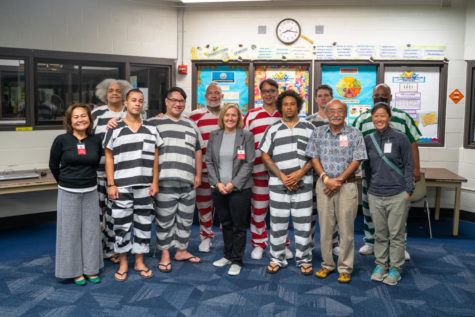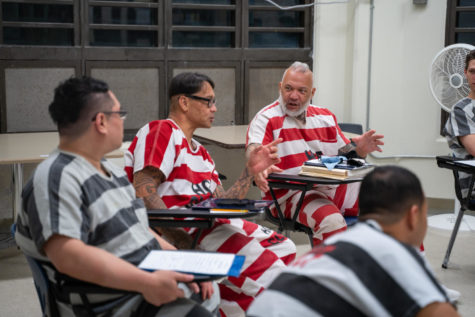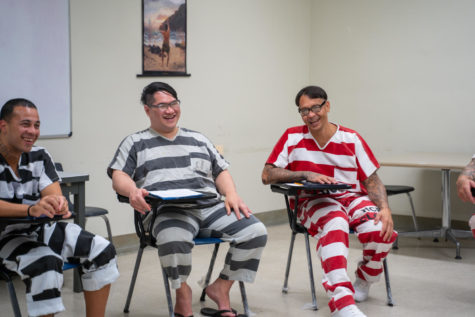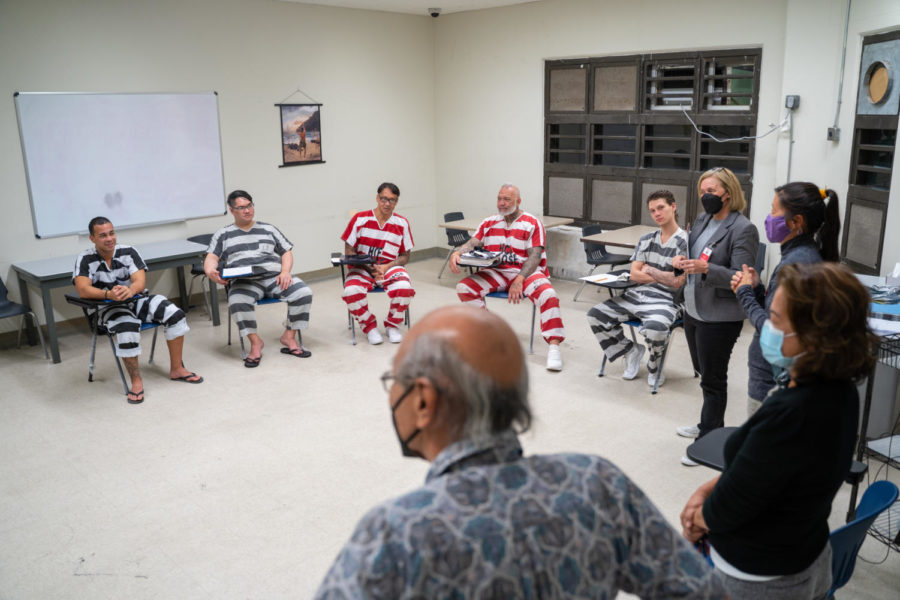Chaminade Offers State’s 1st Degree Program to Halawa Inmates
The first cohort for the Second Chance Pell Grant program meets new faculty. (Photo courtesy of Ren Tachino)
About 12 miles from Chaminade University, in an industrial area surrounded by mountains, are eight individuals. They live in a gated building with giant walls, thick doors, and an army of guards. Every day is the same day for them: sleep, wake up, eat and repeat. However, these eight men have added weekly meetings to their busy schedules. All of them sit, in their different-colored striped uniforms, in a semicircle with a Chaminade faculty member in the front.
In an unlikely place, a Chaminade classroom is hidden within the walls of the Halawa Correctional Facility, and these eight individuals are inmates working toward their associate’s degree in Business Administration. In 2021, Chaminade University launched the Second Chance Pell Grant program for Halawa inmates who could earn a college degree, the first time this was offered in the state of Hawaii.

“I appreciate this opportunity and the professors that genuinely care about our success,” said student Tony Chatman. “This is my second chance.”
Janet Davidson, the vice provost of Academic Affairs at Chaminade University and the head of the program, invited me to travel to Halawa and speak to the students about their experience in this program.
“I am immensely proud of this program,” Davidson said. “I am so proud of Chaminade for supporting this program, our president, our provost, and the faculty teaching. The students have grown so much, and they are phenomenal.”
As the eight students, who range in age from 22 to 70, shared their stories from a small classroom deep within the medium-security prison, the six inmates (two were unable to attend that Monday’s class) reflected on just how much this program means to them. Some said that past educators have never shown them the same compassion or care as Chaminade staff/faculty have. Student Kelson Akeo said he had never been told that someone was “proud” of him until Kim Baxter, a Communications professor, said that to him after finishing the COM 101 course in the first fall semester of the program.
Courses like Accounting and Introduction to Business are offered to inmates to fulfill their Business Administration degree. In addition, they are offered general education courses like History, Poetry and Drama, Criminal Justice, and Communications.
As uplifting as it sounds, these students face many challenges from incarceration. They work out of a learning center where inmates can use laptops and attend classes. Yet, there is a constant struggle to access the center because when there are not enough corrections officers, the center cannot be staffed. Also, even with computers, the students have no access to the internet. They use a limited Canvas that has to have downloaded PDFs and videos from the internet. And when they’re in their cells, they have no access to technology and must handwrite their assignments, including two-page essays.

“We’ve got nothing but time,” said student Keola Rapoza. “We might as well do something with it.”
Despite these challenges in the prison environment, these men experience the same struggles with their schoolwork as other students. A recurring topic was the challenge of meeting the word count requirements for essays. Nikkos Gordon, another student, talked about his determination to keep straight A’s — a mindset that many students rarely uphold anymore.
“We are seen as failures by society,” said Raphael Holley, one of the youngest students in the class. “The stigma is that we are bad because we are in prison.”
Through that stigma, some of them use that as motivation to succeed. Gordon is very passionate about his college education and even earned his high school diploma while in jail. Akeo and Holley received their GEDs while in prison as well.
Davidson instills in the students that it’s “not if they receive their degree” but “when they receive their degree.”
“The other inmates, the correctional officers, all of them do not want to see us succeed, and I just want to prove them wrong,” Gordon said.
Almost all of them hope to continue their education after they are released. Gordon is striving for a bachelor’s degree in Cybersecurity, a master’s degree in Informational Security Analysis, and a doctorate in Cryptology. His goal is to open his own business in security and offer job opportunities to former inmates. Akeo hopes to pursue a bachelor’s degree in Communications at Chaminade University. Rapoza aims to get a bachelor’s degree in Business Administration and open his own business.

“Chaminade helped me pave this path for me,” Rapoza said. “This experience is priceless, and I am blessed.”
All the students’ tuition, textbooks, and fees are fully covered by Pell Grant funding and donations made from First Hawaiian Bank ($25,000), Atherton Family Foundation ($25,000), and Sidney Stern Memorial Trust ($16,500). Chaminade University is the first institution to offer this program in Hawai‘i, and now, Windward Community College is offering courses.
At the beginning of the program, there were 17 students, but it has been whittled down to just eight students. Second-chance programs like this have a national dropout rate of about 35%, according to Davidson, so this program has had “higher attrition” than most. Davidson blamed the COVID-19 pandemic and limited access for this decrease. During lockdowns, faculty members were not allowed to enter the prison, and inmates were not allowed into the learning center. Therefore, students were forced to teach themselves and make do with what was given to them on paper.
The students will finish their associate’s degree at the end of the Spring 2023 semester. Davidson hopes to develop this program to offer a bachelor’s degree and even offer career development.
“I am inspired to do something good and positive with my life,” said Ronald Page, the oldest student in the program. “I know that I will get through it.”
